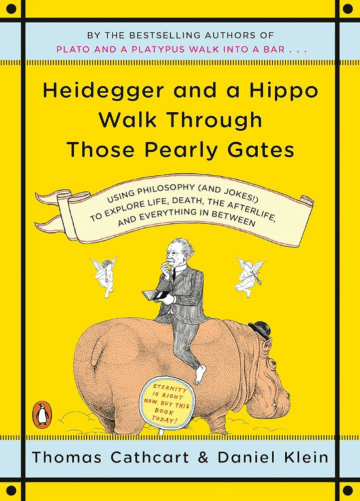Heidegger and a Hippo Walk Through Those Pearly Gates
Q. Neden ölüm hakkında neredeyse seks hakkında olduğu kadar çok şaka var?
A. Çünkü ikisi de ödümüzü koparıyor.
Thomas Cathcart ve Daniel Klein ilk olarak New York Times'ın en çok satanlar listesine giren Plato and a Platypus Walk into a Bar.... ile adlarını duyurdular. Şimdi dikkatlerini Büyük “D” ye çeviriyorlar ve büyük filozofların, teologların, psikoterapistlerin ve bilge adamların zamansız bilgeliğini paylaşıyorlar. Cathcart ve Klein, meleklerden zombilere ve aradaki her şeye kadar, ölüme nasıl yaklaştığımızın, hayatı neden kucakladığımızın ve gerçekten bir ahiret olup olmadığının korkusuz ve saygısız bir tarihini sunuyor. Aydınlatıcı olduğu kadar komik de olan Heidegger ve Bir Hipopotam Cennet Kapılarından Geçerken, ölmeyi bekleyen herkesin mutlaka okuması gereken bir kitap.
Daniel Klein'ın yaşam ve felsefe üzerine diğer düşüncelerini Epikuros'la Seyahatler ve Hayatın Anlamını Her Bulduğumda Değiştiriyorlar kitaplarında okuyabilirsiniz.
Yazar
: Thomas Cathcart, Daniel KleinYayınevi
: Penguen Yayınevi
ÖZET
- Death is one of the immutable facts of human life.
We are the only creatures who comprehend that we are going to die and we are also the only creatures who can imagine living forever.
- Death: you can’t live with it, you can’t live without it.
- Jokes are funny they can make a devastating point while defusing anxiety at the same time.
That’s why there are so many jokes about sex and death – both of them scare the pants off us.
- Martin Heidegger claimed that we actually need the anxiety of death to keep us from failling into “everydayness,”a state in which we’re only half alive, living with a deadening illusion.
Sartre told us to consider the alternative: the only beings that don’t have death anxiety are those that are already dead as doornails.
- We human beings deny our mortality.
- In his masterwork, The Denial of Death, the twentieth-century cultural anthopologist Ernest Becker wrote that even though we know objectively that we are mortal, we cook up all kinds of schemes to escape this devastanding truth.
- Why we desire to deny our mortality is pretty obvious: the prosrect of death is terrifying!
It brings on the ultimate angst.
It gives us the fantods to face the fact that we are only here for a short time,
and when we are gone, we’re gone for eternity.
- According to Ernest Becker, the only way most of us deal with this situation is delusion it gives rise to “immortal systems”. Ever-popular strategy of identifying ourselves with a tribe, race, or nation that lives on into the indefinite future, with us somehow a part of it.
Then there’s the immortality-through-art system, in wich the artist foresees her work enduring forever, and therefore herself immortalized too.
- Then there are the top-of-the-market immortality systems enshrined in the world’s religions ranging from living on as part of the cosmic energy in the East to sailling off to be with Jesus in the West.
At a less lofty level, there is the immortality-through-wealth system.
This one provides us with a nifty life goal to wake up to every morning: go get more Money.
That way we don’t have to think about the Final Bottom Line.
- Go for the bucks route offers another popular way of simulating immortality: donate to an immortal institution, hopefully one that will emblaze on your name on the front of a building, or cut out the middleman and just build a monument to yourself.
- Every civilization has evolved a shared immortality system.
In fact, these systems are the basic function of a culture.
Without them, we’d all go wacko with death-angst and we wouldn’t be able to keep our civilization humming along. We’d return to the law of the jungle.
Denial of death is civilization’s survival strategy!
- Unfortunately, immortality systems make us behave badly.
When we identify with one immortality system and invest it with ultimate personal meaning, we have this nasty problem of coming up against other folks with different systems.
We often see this in the clash of world religions, and it present a major problem: all our immortality systems can’t be right, so the others’ must be wrong.
- Sigmund Freud, named the fear of death as one major factors that drive humans to create and defend the illusion of gods and religion. Because we are helpless before the prospect of death, our unconscious invents a father-figure-in-the-sky to help us cope.
Siggy says, we have a compelling reason to resist our most antisocial instincts – “incest, cannibalism, lust for killing” the Ultimate Father Figure alleviates our fear of death by providibg life everlasting for those who conform to society’s demands.
- Freud thinks belief in God and in God’s promise of eternal life is a cultural fairy tale designed to help us escape the specter of death.
- The Death Drive expresses itself in our need to withdraw from stimulation and pursue peace and quiet; it’s a kind of dress rehearsal for death. Freud referred to this as the “Nirvana principle,” the need to “conduct the restlessness of life into the stability of the inorganic”.
Be your own compost.
- Just because the whole God-religion-eternal-hereafter package comes from our unconscious doesn’t necessarily mean that it’s all hog swill, argued psychologist Carl Gustav Jung.
Maybe our unconscious is wiser than our conscious mind.
Maybe we don’t make up religions, we discover them inside us.
And just maybe, as the unconscious psyche gets passed on from generation to generation, it evolves on its own, getting smarter while our conscious minds merely continue to limp along.
- Jill Bolte Taylor explains that the right hemisphere of the brain processes what is going on for us at the present moment. It thinks in pictures, taking all of the sights and sounds and smells occurring for us right now and putting them together in a whole.
In our right brain, we are “perfect, whole, and beautiful”.
We experience our selves as an “energy being” that is connected to all the energy in the universe and to the energy of the whole human family.
By contrasts, our left brain is linear and methodical.
It takes the present moment and picks out details, connects them to past learning, and projects future possibilities.
It think in language, not pictures, an done of the things it says is “I am.”
It experiences the self as separate from the energy flow around it and separate from other human beings.
- Becker says that in the end neither psychology nor organized religion can provide us with a sanctuary from the life-is-meaningless-and-then-you-die
Neither of those can rid us of the anxiety of facing death, or its flip side, the anxiety of facing a life that is finite and can never satisfy our yearing for infinity.
Those anxieties are part of the human condition, whether we like it or not.
- There is a way to authentically accept our mortality and transcend it in a manner that puts us in touch with a Higher Reality without the need to make trouble with anybody else’s immortality system.
- German philosopher Arthur Schopenhauer says that there’s no reason to have anxiety about death.
That’s because death is the ultimate aim and purpose of life.
It’s like the ultimate fulfillment!
One thing he meant is that life is a constant process of dying.
The past, when you really think about it, is just a repository of death, a heap of nolonger-existing events-gone forever, irretrievable, dead as a doornail.
- Buddha says that all existence is suffering, because the ordinary World is just an illusion.
The only thing that’s really real is means the blind, irrational, aimless.
Force that keeps the whole shebang
- We have this crazy will-to-live.
Wanting to live only makes us suffer more!
So we need to let go, resign ourselves to the futility of the World of appearances, and accept the fact that both life and death are unreal.
- German existentialist Martin Heidegger says that “If I take death into my life, acknowledge it, and face it squarely, I will free myself from the anxiety of death and the pettiness of life – and only then will I be free to become myself”.
We live in denial of death, and in Heidegger’s opinion, that’s not living at all.
We can’t fully realize life unless we are conscious of our upcoming demise.
- “Memento Mori” is one of those catchy alliterations that first caught on when they still spoke Latin in Rome.
It means “Remember you are mortal!” or, in a more recent translation, “Remember you are mortal, goombah!”
Its purpose was to serve as a reminder that “Okay, you’re on top of the world today, but like all of us, the day will come when you are dog meat!”
- Mahatma Gandhi said, “Live as if you were going to die tomorrow. Learn as if you were to live forever.”
- James Dean said, “Dream as if you’ll live forever. Live as if you’ll die today.”
- The French existentialist Jean-Paul Sartre said the meanind of death is that “the for-itself is changed forever into an in-itself that has slipped entirely into the past.”
What Sartre means is that human beings have no “essence,” no predetermined purpose like, say, a rubber ducky does. “In themselves” human beings are nothing; rubber duckies, on the other hand, are quite something, as anyone who’s ever been stuck in a bathtub for three hours can attest. Sartre thinks a key difference between human beings and the duckies is that we humans invent our own essence by choosing to be what we want to be.
We humans are for ourselves, self-created, rather than in ourselves, created for a fixed purpose.
- Philosopher Ludwig Wittgenstein and Paul Tillich had interesting takes on the concept of the Eternal Now.
Tillich, an existentialist Christian theologian, believed that eternal life is not life that goes on and on with no end in sight, like Law an Order.
The eternal is right here in every moment of time.
It is a dimension of time that cuts into time.
The eternal is present now as the Eternal Now.
- Philosopher Allen Stewart Konigsberg “Time is nature’s way of keeping everything from happening at once.
- Ludwig Josef Johann Wittgenstein said “If we take eternity to mean not infinite temporal duration, but timelessness, than eternal life belongs to those who live in the present”.
Wittgenstein’s conclusion that eternal life belongs to people who live in the present has a surprisingly New Age feel to it, more often associated with people like Baba Ram Dass.
- We can’t think of a single major philosopher or world religion that subscribes to the position that death is nothing more than a dreadful prospect, the worst possible cheat imaginable.
To be sure, it would be counterintuitive to resume that religion would take this attitude – reconciliation, in one form or another, is basic to religions’ appeal.
They wouldn’t stay in business long if they told us that death is final and it sucks.
- Greek philosopher, Thales, saw the soul as simply the force that moves the body.
He had acutely observed that one of the big differences between a dead body and a live one is that the former doesn’t move. Ipso facto, something must leave the body when it dies – like, say the motor.
- It was Plato who put together a comprehensive Picture of the soul.
He said there are three parts of the soul: Reason, Spirit (or Will), and the Appetites.
Reason is the highest part, the part that is able to commune with the eternal Ideas or Forms, like Beauty, Wisdom, and the Triangle – that is, the Ideal Triangle, the triangle “Form” from which all earthly, imperfect triangles get their triangularity.
The Will is one of the irrational parts of the soul, but, on the upside, it is nobler than the Appetites.
Properly harnessed, the Will inclines toward Reason.
The Appetites, on the other hand, resist reason, pulling us down toward our sensuous desires, which spells trouble with a capital.
- Philosopher Allen points out that “the soul embraces the nobler aspirations, like poetry and philosophy, while the body has all the fun.” But Plato counters that while the Appetites do have all the fun, they’re actually part of the soul. This is one of the key differences in the philosophies of Plato and Allen.
For Plato, the ultimate goal of the soul is to strip off its sensuous natüre and move toward knowledge of the Forms; immortality is reserved fort he rational part only.
- Aristotle had a slightly different take on the soul, but his conclusion was similar.
He divided the soul into the vegetative soul, which causes the mechanical and chemical changes that we share with animals and vegetables; the animal soul, which creates the locomotion and experiences the sensations that we share only with animals; and reason, which we don’t share with any animal or vegetable.
Ari further divided reason into passive reason (perception) and active reason (thinking, conceiving, visualizing Aphrodite in your bedroom, that sort of thing).
For Aristotle, it is active reason that’s the immortal part of the soul.
- Unlike the Greeks, the Hebrews didn’t see human beings as divided into two seperate parts, body and soul.
The soul in the Hebrew Bible refers to the whole person.
Human beings don’t have souls; they are souls.
And they don’t have are bodies, living bodies.
- In the New Testament. To “lose your soul” is simply to lose your life.
- Soul is regarded by Indian sages as a body part, albeit the “subtle body”.
For the Hindu sages, the Self isn’t something we own individually, like a Harley or a Panama hat: it’s the universal stuff that pervades everything in the universe, as in the ancient parable of the Hindu who asks the hotdog vendor to make him one with everything.
- A lot of Westerners think that reincarnation is the Eastern version of immortality of the soul.
Buddhists concept of reincarnation is the passing of a flame from one candle to another.
No self gets transferred in the deal, because there’s no self to transfer.
- Reincarnation is just an extension of the law of karma.
People who do evil become evil – in this and beyond.
People who do good become good – in this life and beyond.
But what we become in our next life shouldn’t be viewed as a reward or punishment; the purpose of reincarnation is to give us an opportunity to evolve.
- Greek Word for soul is psyche, a Word we now use to mean “mind.”
Psychology, the modern study of the psyche, is the study of the mind,






